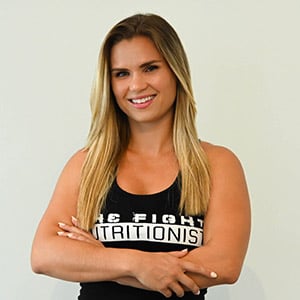It's easy to become a victim to misinformation on the internet when thousands of hits populate every time you type a question into google. Unfortunately, when it comes to nutrition everyone thinks they are an expert — especially if they have personally found success with a particular diet or eating regimen (i.e., fasting).When you're at a crossroads, you should always seek counsel from a qualified health professional like a nutrition coach or a sports nutrition coach. Additionally, individuals that are registered dietitians are a great resource since their opinions and recommendations often stay the same (since they are rooted in science) regardless of the latest diet trends.
So, what are the experts saying when it comes to these 10 common diet myths?
Myth #1: Low-Calorie Diets
The biggest mistake individuals make when decreasing calorie intake is consuming too few calories. Every individual has a minimum caloric requirement. This is known as your basal metabolic rate or BMR. When you consume less than your minimum amount you can run the risk of decreased energy levels, loss of muscle, depressed immune function, and hormonal disruptions.
Furthermore, very-low-calorie diets that result in rapid weight loss often cause rapid weight gain after the diet is no longer followed.
Takeaway. Following a diet that matches your minimum energy needs will result in sustainable weight loss much better than following a very low-calorie diet. Long-term adherence is key.
Myth #2: Fats
Consuming fat does not equate to adding fat to your body. Fats have gained a bad reputation over the last decade, which is what leads to a surge in "low-fat" and "fat-free" products in grocery stores.
However, fat is not bad. We need fats in our diets because they contain many essential vitamins, support hormone production, and makeup all the cell membranes in our body. When consuming fats, you want to increase your intake of unsaturated fats (oils, avocados, nuts) and decrease your intake of saturated fats (butter, margarine).
Myth #3: Breakfast: Is it the most important meal of the day?
This is a regularly debated topic. While it is not so much that breakfast itself is more important than every other meal, it is the quality of food you are consuming shortly after waking up.
When we sleep, our bodies break down stored energy to sustain our organs and other physiological processes. This term is called catabolism.
Researchers that have focused on protein metabolism and muscle protein synthesis argue that while we sleep our muscles enter a state of breakdown. To tip the scale to be in a state of muscle building, they recommend that it is very important to consume a rich source of protein (~20-30g) within an hour of waking up. Additionally, many studies have shown that high protein diets lead to improved body composition such as maintenance/growth of lean tissues and loss of fat mass.
For individuals that favor intermittent fasting, the concept of the importance of the quality of the meal vs the time of the meal still applies. Consuming a breakfast or meal rich in simple carbohydrates can lead to spikes in blood sugar, decreased satiation leading to greater snacking later in the day, and poor concentration and focus.
Therefore, the takeaway is that your first meal to consume upon waking up should contain a healthy mix of lean protein, complex carbohydrates, and healthy fat. Quality matters.
Myth #4: Plant-Based Diets
Everyone who has adopted a vegan or vegetarian diet claims it is the best thing you can do for your health and longevity. It is such a popular diet trend that many documentaries have been created in support of its practice.
However, here is what you need to know about plant-based diets:
• Plant-based proteins are absorbed much less efficiently than animal-based proteins. To meet your daily protein needs, your intake of plant sources will likely be double meet your daily needs.
• Plant-based diets are rich in fiber and phytates. High intakes can often block or decrease absorption of other minerals such as zinc, calcium, and iron in the gastrointestinal tract leading to nutrient deficiencies.
• Vitamins like B12 and D are largely found in animal products. Plant-based diets can lead to deficiencies in these nutrients.
So, what is the consensus? While plant-based diets are very healthy and can be beneficial, some nutrition considerations need to be taken into account to prevent the risk of any deficiencies.
Myth #5: Late Night Eating
Does eating after 8 pm cause weight gain? The answer is NO.
Consuming food late at night does not equate to excess fat storage on your body UNLESS you are consuming more calories than you've expended for the day. What are the best foods to eat late at night? Foods that are high in protein!
Myth #6: Protein
Proteins are metabolized in the liver (this is known as the urea cycle), where ammonia (a by-product of protein metabolism) is converted to urea. Then the urea is filtered and excreted out of the body via the kidneys. The biggest protein myth is that intake of too much protein can overwhelm the kidneys and cause damage. However, MULTIPLE studies have shown over many years that this is not true.
The recommended dietary allowance for protein is 0.8g/kg body weight to prevent any nutrient deficiencies. However, it has been shown that this amount is much too low for the average individual, especially active individuals. The international society of sports nutrition (ISSN) recommends that healthy, active individuals should consume between 1.2-2.4g protein/kg of body weight/day.
Unless an individual is suffering from severe kidney damage, high protein intake will not cause health problems. Even in cases where patients have kidney damage, their protein needs are elevated. For example, a patient with CKD on dialysis should still be getting 1-1.2g protein/kg of body weight/day.
High protein diets also improve body composition, increase satiation, and improve various metabolic markers.
Myth #7 Supplements
Supplements are a multibillion-dollar industry. While they can help, they are not always necessary. Something to note about supplements is that they are not all tested for banned substances or label accuracy/purity.
Therefore, before choosing to consume a supplement you should check to see if you are consuming a reliable product.
For performance-enhancing supplements you should look for these three logos:
• NSF certified Sport
• Informed Choice/Informed-Sport
• BSCG
For vitamins and individual nutrients look for USP verified marks. Takeaway… Supplements can help fill the gaps of nutrients you may be lacking in your diet.
However, you cannot out supplement a bad diet.
Myth #8: Nutrient Timing
For individuals looking to enhance their performance and get an extra advantage over their opponents, nutrient timing can be very useful. However, are the windows of nutrient consumption necessary for everyone? No.
The biggest nutrient timing myth is that you MUST consume protein within 30 minutes to an hour after your workout. This is not true. The benefit of protein consumption on enhancing muscle recovery is largely dependent on the last protein-rich meal you consumed. Additionally, while the benefits of protein consumption are most rapid in the first two hours following exercise, consumption beyond that time frame still provides considerable benefit.
Takeaway? Protein consumption at any time is beneficial. If it is feasible to consume protein immediately after your workout, this will be beneficial. If you can't consume protein for a few hours after your workout, it will still be beneficial.
See also: Nutrient Timing
Myth #9: Juice Cleansing
It is a common belief that going on a juice cleanse can quickly shed pounds and melt fat. Additionally, fans of this practice claim it can alkalize (change the pH of) your blood and detoxify your liver and cells.
First, any significant weight loss as a result of a juice cleanse is coming mainly from water and potentially muscle. Juices are rich in vitamins and minerals but lack fiber, protein, and healthy fats. Important components to a healthy diet.
Second, the pH of blood is VERY tightly regulated. It must be maintained within a narrow range of 7.35-7.45 to ensure the proper functioning of metabolic processes and proper delivery of oxygen to tissues. Consuming juices will not change the pH of the blood.
Third, the liver and kidney's main purpose is to detoxify the body. Going on a juice cleanse is not going to enhance this process.
Myth #10: Carbohydrates
The biggest nutrition myth in existence is that carbohydrates are bad for you and lead to weight gain. This is FALSE. Carbohydrates are a very important macronutrient in our diets. They can be found in bread/bread products, fruits, vegetables, legumes, and milk products. They contain many essential vitamins and minerals needed to support various metabolic functions.
Additionally, carbohydrates are the preferred fuel source for our brain and every other cell in our body!
When we consume carbohydrates, we either use them for energy or store them in our muscles and liver. When muscle stores are fully saturated, carbohydrates are then converted to fat for extra storage in the body. Therefore, consuming moderate amounts of bread or pasta in your diet will not lead to significant weight gain.
Conclusion
When you're working with a client that asks one of these common questions, it is always important to inquire more about the topic, why it matters to them, and ask where they found the information. Referring clients to credible sources and science articles will always be a great way to dispel any misconceptions they have.
Unfortunately, so many myths exist because individuals attempt different diets or dieting methods to improve their body composition, fitness, or overall health. When they experience the success, they often proclaim it's the only solution and everyone should adopt the diet or practice.
Alas, every individual is different and has different needs. There is no one size fits all solution when it comes to nutrition. The best practice is to create an individualized program for your client that they can easily adhere to over a long period.

















